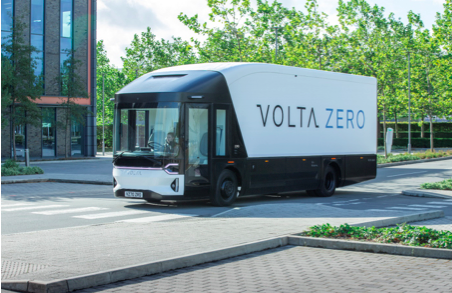 Volta Trucks has officially unveiled its first electric lorry, a 16 tonne resin-bodied unit for urban logistics that it aims to deliver at comparable cost to diesel equivalents.
Volta Trucks has officially unveiled its first electric lorry, a 16 tonne resin-bodied unit for urban logistics that it aims to deliver at comparable cost to diesel equivalents.
The firm is targeting production in 2022, though will deliver early models for trials by mid 2021. Logistics firm DPD is one of the early UK trialists.
The trucks will be powered by 160-200kWh lithium iron phosphate batteries, delivering range of 95-125 miles, according to Voltatruck. Payload is 8,600kgs.
The trucks, dubbed ‘Volta Zero’ have also been designed to be much safer for other road users, with the driver sat much lower in a cab with 220 degree visibility.
Trucks as a service
The ‘ICE cost comparable’ claim is on a total cost of ownership basis rather than upfront, but the firm also wants to bundle leasing of trucks, support and infrastructure, or ‘trucks-as-a-service’. It said the finance model will put Volta Zeros within reach of smaller operators aiming to decarbonise operations within UK cities.
The firm aims to be the world’s most sustainable commercial vehicle supplier.
“By 2025, we aim to have saved around 180,000 tonnes of CO2 from the atmosphere – the equivalent annual CO2 usage of 24,000 houses – and improved inner-city air quality by emitting no pollutants,” said Volta Trucks CEO, Rob Fowler.
Manufacturing contract ‘by year end’
Speaking at a press launch, Fowler, who spent ten years at DPD and oversaw its EV strategy prior to taking the helm, said Volta Trucks plans a contract manufacturing approach. He said negotiations with “two or three” firms are ongoing with a contract award likely by the year-end.
Infrastructure challenge
Fowler acknowledged the challenges around charging infrastructure and grid capacity within city centres, but said the firm and its partners could devise solutions to constraints within its ‘as-a-service’ package.
“The idea is the customer focuses on running logistics operation and Volta Trucks makes sure the vehicles are working for them. We recognise that, particularly within SMEs, many operators just don’t have the depth of knowledge to truly understand the complications of putting commercial EVs on fleet,” he said.
“There are a number of ways ways of managing constraints. We’re working on the basis that all of our vehicles will return to a depot overnight, providing 6-8 hours charging time,” added Fowler. “Of course, anything around onsite storage or renewables is something that can be looked at if required, and we do have a rapid charging solution.”
However, he said most operators should be able to avoid that approach – and most would naturally eschew investing in additional infrastructure that requires rapid depreciation at leased sites.
Details here.



